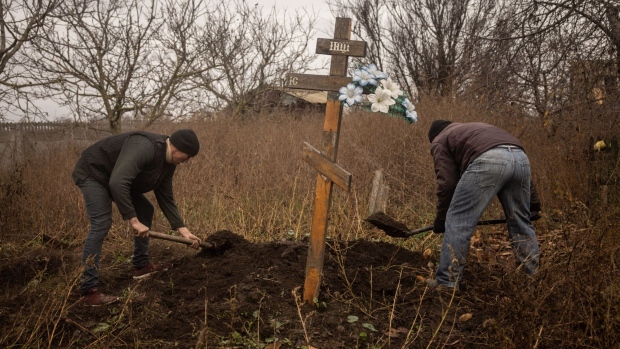Nov 30, 2022
US Says It Fears Russia May Use Biological Weapons in Ukraine
, Bloomberg News

(Bloomberg) -- Russia’s invasion of Ukraine has elevated US concerns that Vladimir Putin’s government could use biological weapons, according to a top US State Department official who’s in Geneva for a review of the global treaty addressing such threats.
“We’ve always been concerned about their own biological program,” Under Secretary for Arms Control and International Security Bonnie Jenkins said, speaking from the US Mission in Geneva. But those concerns have increased as Russia has continued to make unsupported allegations about US development of biological weapons in Ukraine. Such disinformation could mask Russia’s own weaponization of infectious diseases, she said.
“As long as they continue the unprovoked invasion of Ukraine -- staying there and doing what they’re doing and making these allegations -- there’s always a possibility that they’ve been using” disinformation as a cover, she said.
The veteran diplomat spoke in an interview paces away from the European headquarters of the United Nations, where health and security experts have gathered for a three-week conference to review the Biological Weapons Convention, a Cold War-era treaty that was the first to ban a class of weapons of mass destruction.
Read More: Russia’s Ukraine Claims Risk Thwarting a Global Conference on Bioweapons
In April, the State Department said in a report that the US assessed that Russia maintains an offensive biological weapons program in violation of the disarmament treaty. The report highlighted prior breaches, while indicating that the intelligence behind the current determination remains classified.
Conference Chaos
So far, Russia’s disinformation campaign has dominated the international forum that’s intended to strengthen the Biological Weapons Convention. Russia has used the platform to double down on its unsupported claims of biological weapons labs in Ukraine, while also maintaining that its invasion was irrelevant to the forum. Those comments have drawn a backlash from the US, Ukraine and their allies.
On Wednesday, after public spats earlier in the week, Leonardo Bencini, an Italian diplomat and president of the review conference, pulled the Russian delegation to the side of the room for a private sidebar. The Russians shook their heads repeatedly in dissent, and the conversation continued until the president broke away and invited nongovernmental organizations to give statements, which predominately focused on advances in science and technology.
Later, Russia rehashed its allegations, and the US responded it wouldn’t engage further on the claims.
Jenkins said the US delegation doesn’t want Russia’s disinformation campaign to distract from good-faith efforts to strengthen the Biological Weapons Convention. At the end of three weeks, countries much reach consensus on future disarmament priorities.
“Russia can very easily be a spoiler,” Jenkins said. Another review conference won’t be held for five years, and the Russian disinformation could stymie the rare opportunity for progress, she said.
One of the conference’s goals is to bring the treaty “into the 21st century,” she said, and “Covid woke people up” to the dangers of biological threats.
©2022 Bloomberg L.P.


